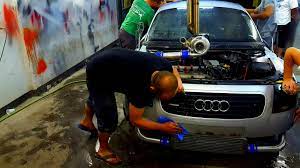The National Highway Traffic Safety Administration estimates 150,000 vehicles sold every year in the United States contain repeating, unfixable defects. These “lemon” vehicles make their way to thousands of American consumers each year after leaving the factories of manufacturers including Toyota, General Motors, Honda and more. Regardless of what causes the defects (shoddy workmanship, faulty components, substandard materials), it is the manufacturer’s duty to fix the problem. These defects cost American consumers millions every year in lost wages, alternative transportation costs, towing fees and other unexpected expenses when their new car breaks down; not to mention potentially putting the consumer in danger if the defect involves a critical safety system.
Each state has its own version of a lemon law providing legal resources for consumers wronged by automotive manufacturers. The federal Magnuson-Moss Warranty Act provides protection at the national level as well. Consumers with lemon problems are encouraged to reach out to a qualified lemon law attorney to get the best possible help with their claim.
For more information on arbitration and other frequently asked lemon rule questions, click here.
The Texas lemon law, like the lemon rules in other states, protects those who inadvertently purchase defective vehicles. The law refers to these lemon problems as “nonconformities,” as they throw vehicles out of conformity with their written manufacturer’s warranties. The Texas lemon law specifically covers “serious defects,” defined as a problem that “substantially impairs the use or market value of the vehicle.” If the problem makes it harder for the consumer to safely use the vehicle, such as an engine or braking problem, the Texas law covers it. If the problem makes it harder for the consumer to sell the vehicle close to market value, such as an unpleasant odor or problem with the paint, the Texas lemon law covers that as well.
Before a consumer can begin the Texas lemon claims process however, the vehicle must meet at least one of the law’s lemon tests. Once a vehicle meets at least one of these sets of circumstances, the law’s protections go into effect. These lemon tests include the four times test, the 30 days test, or the serious safety hazard test.
Think you have a lemon, click hereto fill out a 30 second form
The four times test means the manufacturer can attempt to repair the defect four times within a certain timespan. At least two attempts must happen within one year of the consumer receiving the vehicle or within the first 12,000 miles driven, with the next two occurring within one year or 12,000 miles driven after the first repair attempt. If the manufacturer cannot successfully repair the problem, the vehicle passes the “four times test” and is considered a lemon.
A vehicle passes the 30-day test if it has been in the shop for repair because of lemon problems covered by the original factory warranty for 30 days or more. Specifically, these 30 days must occur during the first two years or 24,000 miles of ownership without a comparable loaner vehicle offered, and there were two repair attempts during the first year or 12,000 without any success.
A vehicle passes the serious safety hazard test of the owner takes it to the manufacturer to repair a serious safety problem during the first 12 months of ownership or 12,000 miles driven, whichever comes first, and then once more during the 12 months or 12,000 miles following the first repair attempts without the problem being fixed. The Texas lemon law defines a “serious safety hazard” as any life-threatening malfunction that substantially impedes the driver’s ability to control or operate the vehicle normally, or that creates a substantial risk of fire or explosion.
Lemon laws are confusing. Read our guide to the lemon law process.
The lemon rule that applies across the United States is the federal Magnuson-Moss Warranty Act of 1975. The Act supersedes state law at the federal level and forces manufacturers to use plain, easily understood language in their written warranties. The Act requires companies make clear statements in their warranties, otherwise those ambiguities will be held against the company in court.
The Act was signed into law in response to widespread alleged consumer rights violations by manufacturers in the 20th century. Before the Act’s advent, the prevailing consumer knowledge was caveat emptor: let the buyer beware. As the economy grew more complex and more steps separated manufacturers from the end consumer, Americans demanded more protections.
The Uniform Commercial Code was an early attempt at harmonizing commercial transaction laws across the United States, but states were allowed to adopt those rules either fully or partially. Every U.S. state but Louisiana adopted UCC rules, who instead opted to keep their own civil law traditions. The Magnuson-Moss Warranty Act, however, codified these rules into American law giving consumers and their lawyers tools to pursue justice.
The lemon law attorneys of Allen Stewart P.C. have the tools and knowledge needed to keep your vehicle’s manufacturer honest and fight for the best outcome for your claim. They will keep you up to date and informed throughout the process, answering any question you may have about the process. Statutes of limitation mean the longer you wait, the harder it’ll be to get justice. Don’t wait any further, contact Allen Stewart P.C. today.
